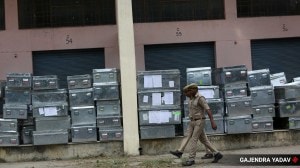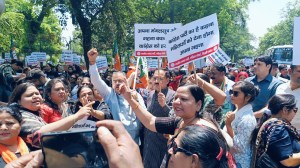- India
- International
Textile industry woes: Bhiwandi powerlooms continue to struggle with issues post GST
Low capital, unsold stock; not many able to restart looms in full scale
 Since GST came into force on July 1, an entire ecosystem of the textile industry — weavers, technicians, daily wage workers and labourers — was hit as looms were forced to shut down. (Representational Image)
Since GST came into force on July 1, an entire ecosystem of the textile industry — weavers, technicians, daily wage workers and labourers — was hit as looms were forced to shut down. (Representational Image)
EVEN AS the textile industry in Bhiwandi, the powerloom capital of Maharashtra, crawls back to life after the impact of the Goods and Services Tax (GST), it is still struggling to deal with several issues such as capital, return filing and unsold stock. “The shutdown after GST has resulted in lower capital with weavers who have exhausted their earnings during the shutdown. With little left for buying raw material, not many are able to restart the looms to full scale,” said Tahir Momin, a former MLA whose family owns around 500 looms. He said a large part of the textile industry in Bhiwandi was busy figuring out the three different tax returns to be filed.
“We are not well-versed with the new tax system and neither are we comfortable with technology. Most of my time is spent trying to understand the return filing system,” said Momin. Ehsan Ansari, another weaver, said even as the government had relaxed the tax on job works or intermediary works involved in the conversion of yarn to cloth, challenges remain as the sale of cloth was yet to pick up. “Dealers and traders are unwilling to buy from weavers without a GST number even if their (weavers’) annual income is below Rs 20 lakh. Business is dull as most of us are sitting with unsold stock,” said Ansari, who has so far restarted 60 per cent of his 700 looms.
Since GST came into force on July 1, an entire ecosystem of the textile industry — weavers, technicians, daily wage workers and labourers — was hit as looms were forced to shut down. As an immediate aftereffect, around five lakh powerlooms closed in Bhiwandi in 20 days, according to estimates by owners or “master weavers”. The industry, which had remained exempt from taxation since Independence, reeled under the impact of GST regime. Now, the master weavers have to pay taxes for buying yarn — 18 per cent on man-made fibre yarn and 5 per cent on cotton yarn. They had raised concerns over the tax on job works —5 per cent on cotton yarn and 18 per cent on man-made fibre yarn. On August 7, the GST Council decided to cut it and adopt a uniform rate of 5 per cent.
Despite the relaxation, the looms are still struggling to go back to normalcy. Bhiwandi’s textile industry is decentralised where master weavers own powerlooms but sublet most work to contractors. The conversion of yarn to cloth requires at least 10 levels of work, including transport, sizing, warping, weaving, mending, folding and packaging, each needing special set of skills.
“We are encountering several challenges as we go. Accounting has become one of the biggest challenges,” said Momin. State GST Commissioner Rajeev Jalota said workshops are not being conducted anymore but regional offices are helping traders with filing. “We are helping traders with the process. Anybody having trouble can approach us and we will help them. We are also appealing to local trade associations to help traders and weavers,” he said.
Apr 24: Latest News
- 01
- 02
- 03
- 04
- 05







































